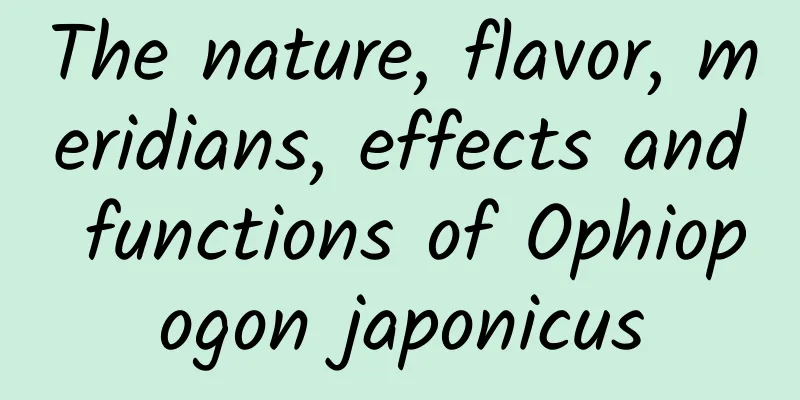The nature, flavor, meridians, effects and functions of Ophiopogon japonicus

|
As we all know, Ophiopogon japonicus is a traditional Chinese medicine with high medical efficacy. Its main functions include: enhancing the body's immunity, protecting the heart, lowering high blood sugar, moistening the lungs and relieving cough, strengthening the heart and promoting diuresis, clearing the intestines and promoting bowel movements, promoting fluid production and nourishing the stomach, etc. It is more suitable for patients with yin deficiency. It is also widely used in medicine, but it cannot be taken with winter melon, bitter melon, fungus, etc., and pregnant women and people with diarrhea cannot eat it. Alias: Ophiopogon japonicus, Cun Ophiopogon japonicus, Cundong, Ophiopogon japonicus, Ophiopogon japonicus, Broad-leaved Ophiopogon japonicus, Large-leaved Ophiopogon japonicus, Wild Leek Nature and flavor: sweet and slightly bitter, slightly cold. Meridians: Heart, lung, spleen and stomach meridians. Applicable constitution: Yin deficiency constitution Classification of the efficacy of Chinese medicine Ophiopogon japonicus (Ophiopogon japonicus) Yin-tonifying Chinese medicine Traditional Chinese Medicine Ophiopogon japonicus (Maimendong)> Description Traditional Chinese Medicine Ophiopogon japonicus (Maimendong) is the dried tuberous root of the perennial herb Ophiopogon japonicus of the Liliaceae family. It is mainly produced in Sichuan, Hubei, Zhejiang and other places, and is distributed in many areas of the country. Dig up in summer, wash, remove the fibrous roots and dry in the sun. Use raw. The nature and flavor of the Chinese medicine Ophiopogon japonicus (Maimendong) and its meridians, and its effects and indications. The nature and flavor of Ophiopogon japonicus and its meridians: sweet, slightly bitter, and slightly cold. It enters the lung, heart and stomach meridians. The effects of Ophiopogon japonicus: nourishing yin and moistening the lungs, benefiting the stomach and producing body fluids, clearing the heart and relieving restlessness. Ophiopogon japonicus is mainly used for dry cough with thick sputum, cough with blood due to exertion, thirst and dry throat, restlessness and insomnia. Effects of Chinese medicine Ophiopogon japonicus 1. Enhance immune function 2. Sedative effect 3. Anti-tumor effect 4. Improve heart function 5. Improve blood sugar function 6. Free radical scavenging function 7. Protect the heart: Ophiopogon japonicus contains a variety of steroidal saponins, β-sitosterol, and sterol. It can improve the body's tolerance to hypoxia, increase coronary blood flow, have a significant protective effect on myocardial ischemia, and can resist arrhythmia and improve myocardial contractility. Application of the efficacy of Chinese medicine Ophiopogon japonicus (Ophiopogon japonicus) 1. The Chinese medicine Ophiopogon japonicus (Ophiopogon japonicus) can benefit the stomach and produce body fluid. It is used for thirst and dry throat caused by damage to stomach fluid due to heat, and can be used together with Adenophora stellariae, Polygonatum odoratum, etc., such as Yiwei Decoction. 2. The Chinese medicine Ophiopogon japonicus (Maimendong) can clear the heart, relieve restlessness and calm the mind. It is used for night heat, irritability and restlessness caused by evil heat entering the blood. It is often used together with raw rehmannia root, bamboo leaf heart, etc., such as Qingying Decoction. It is used for yin deficiency with heat, restlessness and insomnia, and is used together with Chinese jujube seeds, raw rehmannia, etc., such as Tianwang Buxin Dan. In addition, this product can moisten the intestines and promote bowel movements. It can be used together with raw rehmannia and scrophularia to treat dry intestines and constipation, such as Zengye Decoction. 3. The Chinese medicine Ophiopogon japonicus (Maimendong) is sweet in taste and enters the lungs. It can moisten the lungs, nourish the lung yin, and resolve phlegm and relieve cough. It is used for dry cough with sticky sputum, dry throat and nose, and is used together with mulberry leaves, donkey-hide gelatin, such as Qingzao Jiufei Decoction. It is used for cough with hemoptysis and dry cough with thick sputum due to deficiency of lung yin. It can be taken orally with equal parts of Asparagus cochinchinensis and honey, which is called Erdong paste. |
<<: Effects of Podophyllum on Women
>>: What are the effects of Uncaria rhynchophylla
Recommend
The efficacy and function of dandelion root
Every spring, many people go to the fields to dig...
How many tsips of tsips should be soaked at one time?
Tiepi Maple is very popular and is also one of th...
What are the weight loss effects of Poria cocos
Many people in modern society suffer from obesity...
The efficacy and function of Taxus cuspidata
For Chinese medicinal materials such as Taxus cus...
The efficacy and function of the falling bell
Traditional Chinese medicine is very helpful in t...
How to build a habitable planet? An interview with Charles Langmuir
【Author】Xu Yigang 【Translation】Zhao Siyu, Yang Ya...
Can I eat Radix Pseudostellariae if I have a cold?
When you have a cold, there is heat in your body,...
Is lying really related to the nose? Everyone is Pinocchio!
I believe everyone has heard of the fairy tale &q...
The efficacy and function of giant saxifrage
Many people choose Saxifraga because of its high-...
Can gelatin be frozen?
Many female friends have a certain understanding ...
“May Day” Cultural Tourism Big Data Report: Tourism enthusiasm has recovered strongly!
The 2023 May Day holiday has come to an end. For ...
What are the effects of Astragalus?
As for what effect does Astragalus have, I believ...
This "fever-reducing magic medicine" has been cancelled by the Food and Drug Administration! It has been banned in many countries before..
On November 12, the State Drug Administration iss...
What should we do to prevent the “Lost Gull” from being lost again?
A flash by the Ruoshui River In 1931, the Swedish...









